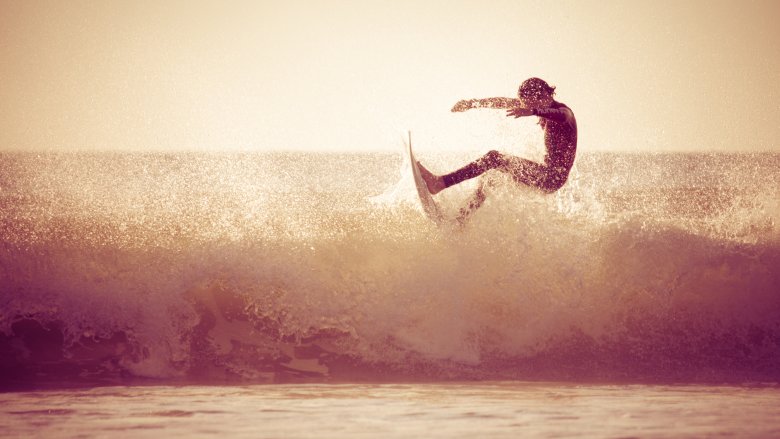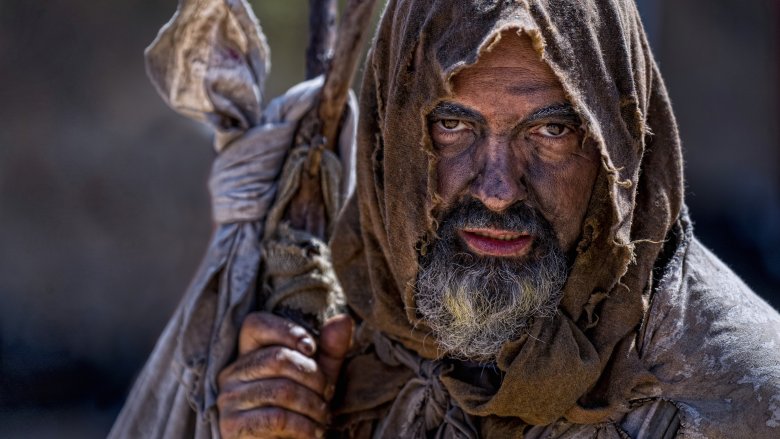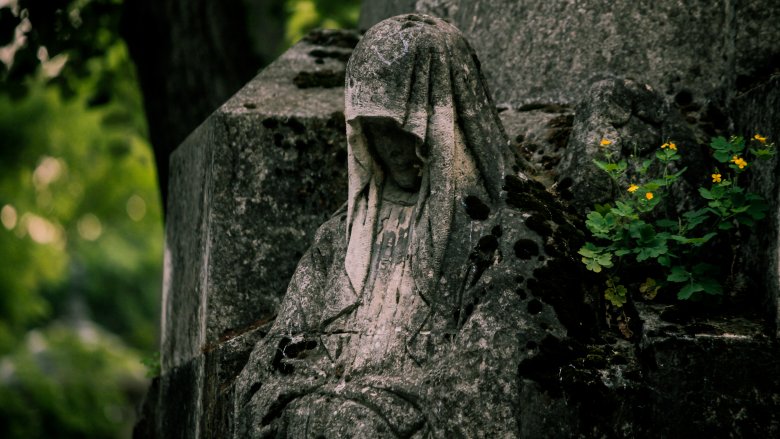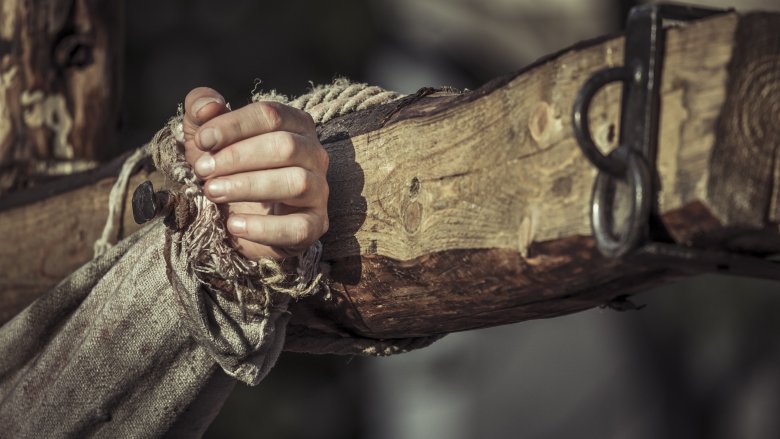Once Popular Words That No One Uses Anymore
Language is a funny old thing. We take it for granted most of the time, but it's incredible to think that countless people have come to almost the same understanding of what some randomly ordered letters refer to. It's even stranger when you start looking at things like slang words, or words that were once on the tip of every tongue that no one even remembers anymore. Some of these words need to be brought back. Others need to be forgotten. Hard. Let's take a look at some of the best ones and expand your vocabulary a bit.
Arf-an-arf, and arf'arf'an'arf
Let's head back to Victorian England for some drunk slang that's fun to say. According to the admittedly dull-sounding 1909 book Passing English of the Victorian era: A Dictionary of Heterodox English, Slang and Phrase, if you were hanging out in a Victorian pub, you might order an arf-an-arf. That's the drink we now call half and half (or, if you want to be less politically correct, a black and tan). It's traditionally a pint that's half porter and half ale, so you can see where arf-an-arf comes from. Just imagine some salty seadog, fresh off a trade ship from India, stomping into a dockside pub and demanding his "arf-an-arf!"
If he happened to demand a few too many, he might become what was called arf'arf'an'arf, as in, "Old One-Thumb Harry was so arf'arf'an'arf he tipped over a lantern, set himself on fire, and then fell off the dock." We've all got stories about those nights.
Damfino
We're not entirely sure where damfino came from, but we do know it makes an excellent PG-rated curse, and people need to use it more.
According to Passing English of the Victorian Era, it's a shortened version of "I am damned if I know." If you're in a situation that calls for that particular curse, "damfino" is the way to say it with a verbal shrug and an eye roll. That's especially true in the chaos of today's world, when you can drop gems like: "Damfino how they didn't see that advertisement was horribly racist."
In spite of Victorian roots, the word was hugely popular through the 1920s thanks to Buster Keaton. According to the International Buster Keaton Society, Damfino was the name of a boat associated with him, mostly because it's a ready-made punchline just waiting to be delivered after the boat sinks. Humor has changed a lot, too.
Cowabunga
It hasn't been long since the Teenage Mutant Ninja Turtles and Bart Simpson made saying "Cowabunga!" popular. No one says it anymore — at least, not if you want to avoid getting beat up in the parking lot after school or work — and we don't have to tell you how fast this one faded from popularity.
What is strange is that this exclamation of happy solidarity is way older than you think. It wasn't invented by or for the Turtles at all, and it wasn't even the happy, goofy exclamation you know it as. Originally, it was one of a few nonsense words created for the Native American character Chief Thunderthud, a regular on the 1950s Howdy Doody Show. He used it to show when he was mad or annoyed with something, pretty much the opposite of what it turned into. According to word researcher Paul McFedries (via BuzzFeed), cowabunga survived first because it was picked up by TV's Gidget, then made it into the surf culture of the 1960s. They turned it into the happy greeting Michelangelo used in the 1980s, which Bart Simpson adopted in the 1990s. And then, it was finally and thankfully allowed to die.
Crapulous
There's no reason crapulous should have fallen out of favor because it describes an unpleasant state we've all experienced, and one we've all lied to someone about. Dictionary.com defines it as the feeling you have after you've gone a bit overboard indulging in either alcoholic drinks or just plain old food, and you know you've been there. You know precisely the feeling it describes, even if you never knew there was a word for it.
Trust the ancient Greeks and Romans to have us covered. The word dates back to around 1530, and has roots in ancient words meaning pretty much the same thing. If you wake up with a nauseous sort of headache and not a little bit of regret after a night of drunken debauchery, feel free to call in with a scary-sounding diagnosis of crapulence. Technically, you can even say it's contagious.
Zozzled
Some words are fun to say, and zozzled is one of them. It's a friendly, fuzzy-sounding sort of word, and according to writer Sarah Zama, it was just one of the ways Prohibition-era people described someone as being drunk.
She says it's likely a variation of the 1880s word sozzled, which is also fun and has also fallen out of popular use. It's a particular kind of drunk, and you can use it to say things like, "Buster was so zozzled he didn't even realize he sat down in someone else's spilled drink, and fell asleep anyway." It's a messy, careless kind of sloppy drunk, and we all know those people.
Zama says there were a ton of words used to describe the state of drunkenness in the 1920s, and some (like plastered and tanked) have stayed in common parlance. Others haven't, like blotto, stinko, spifflicated, ossified, and embalmed. With some of the horrible stuff happening during Prohibition, that last one was occasionally more accurate than you'd think.
Abraham-man
There are a few different versions of the word Abraham-man, but Abram, Abram-cove, and Abram-man all mean the same thing. You know what it is, too, because he's still a pretty popular character in a certain type of movie. If you've seen any period piece with a shady-looking, scruffy beggar spouting a whole lot of lunacy, that's an Abraham-man.
According to A Dictionary of Slang and Colloquial English, Abraham started out as a 16th-century term for a used clothing store, then turned into a reference to hard work that didn't pay well. An Abraham-man was then a man who wore ragged clothes and roamed the Elizabethan countryside, but he was more than just a beggar. He was someone who was putting on an act that had some kind of falsehood about it, whether he was stealing as he begged or acting like a nutter to get people to offer handouts in exchange for his disappearance down the road. Hey, at least he was his own boss.
Ginchy/ginchiest
If someone came up to you and told you, "You're just the ginichiest cat in town," what would you do? Thank them? Hit them? Actually, that depends on what you think of the person who's saying it to you because they just called you a very attractive, sexy sort of guy or gal (via YourDictionary.com).
It was a huge compliment in the 1950s, and according to Turner Classic Movies, it was made popular by actor Edd Byrnes. You might not remember him as he sort of fell off the face of the earth after hitting a rocky patch in his career. (Heroin. He hit heroin). He was a lead on 77 Sunset Strip and played a carhop with aspirations of being a detective. Part of his shtick was his slang, including calling the coolest people he knew the "ginchiest." The term ended up a part of the era's pop culture, but it didn't last.
Air-hole
That's air-hole, stop giggling. It's actually pretty depressing, too, and once you know what it is, you'll feel more than a bit guilty if you did happen to laugh.
One thing we rarely take into consideration when we say we'd rather go back in time to live in Victorian England is the very big problem of body-disposal. The Guardian looked at just how bad it was, and it was bad. Cemeteries and churchyards were full, coffins were hacked to pieces and more bones were buried in the same plots. There's other stuff you'd rather not know, so let's just say reformers had their work cut out for them when they decided something had to be done.
That's the era of air-holes. It was the name for small public gardens across London, according to archivist James Redding Ware. The catch? They were cemeteries converted into gardens, and there was rarely any effort taken to disguise what they once were. Most even still contained headstones, piled up or standing along the walls. Picnic, anyone?
Twitterpated
Twitterpated. It sounds innocent and a little bit adorable, doesn't it? It's the feeling of the racing heart, weak knees, and sweaty palms that happens when you see a new love walk into the room, and it's a shame we don't really use this one anymore.
It was popular for a while, and it should sound familiar. Oxford Dictionary says it was invented by Disney for that nightmare-inducing, childhood-ruining movie that masquerades as a cute little tale about woodland creatures, and of course, we're talking about Bambi. Actually, you know what? No wonder no one uses it anymore. Too soon.
Oysterics
That's as in, "The town was gripped with the oysterics as people started dropping like flies from the worst case of food poisoning anyone had ever seen."
It's a serious idea with a bit of a tongue-in-cheek wordplay, and archivist James Redding Ware says it's a play on the word "hysterics." At the turn of the 20th century, a very real health scare swept through England. It was believed bad oysters had caused an outbreak of typhoid fever, and the resulting public health panic was dubbed "oysterics." The term was used for years after the original outbreak, and it probably needs to make a comeback because you can never have too much satire in the world.
Sockdolager
We kind of understand why sockdolager fell from favor, and it's a weird story. Linguist James Harbeck says it's an American word that became popular in the 19th century, and it's a very American word, indeed. It means something along the lines of a final blow, whether it's a physical one or a verbal one. It's the knock-out punch, it's the humdinger you deliver to end whatever shenanigans are afoot.
It's also likely one of the last words President Abraham Lincoln ever heard. Right before he was assassinated by John Wilkes Booth, an actor on-stage for the performance of Our American Cousin delivered the line, "Well, I guess I know enough to turn you inside out, you sockdologising old man-trap." The audience went wild because that's what passed for humor in 1865, and amid the laughter, Booth fired that fatal shot.
Zounds (and company)
"Zounds!" sounds like it was invented just for Scooby Doo, but it wasn't. According to Merriam-Webster, zounds was first used in 1592, and it was more polite way of saying "God's wounds." Uttering that kind of blasphemy was just out of the question, but where there's a will, there's a way. People have found all kinds of ways to get their points across without actually blaspheming, and it's a shame we still don't use most of these.
The epic 'sblood dates from around the same time, and refers quite obviously to God's blood. There's gadzooks, a 17th-century curse seen as a slightly more polite way to curse by God's hooks — in other words, the nails used to crucify Christ. There's strewth, which didn't show up until the 19th century and until people were cursing God's truth, and there's 'sdeath, an addition the Collins Dictionary says comes from America. Even the Yanks were getting creative in the ways they cursed to God Almighty ... while still hoping to fly under the radar and not offend too much.











